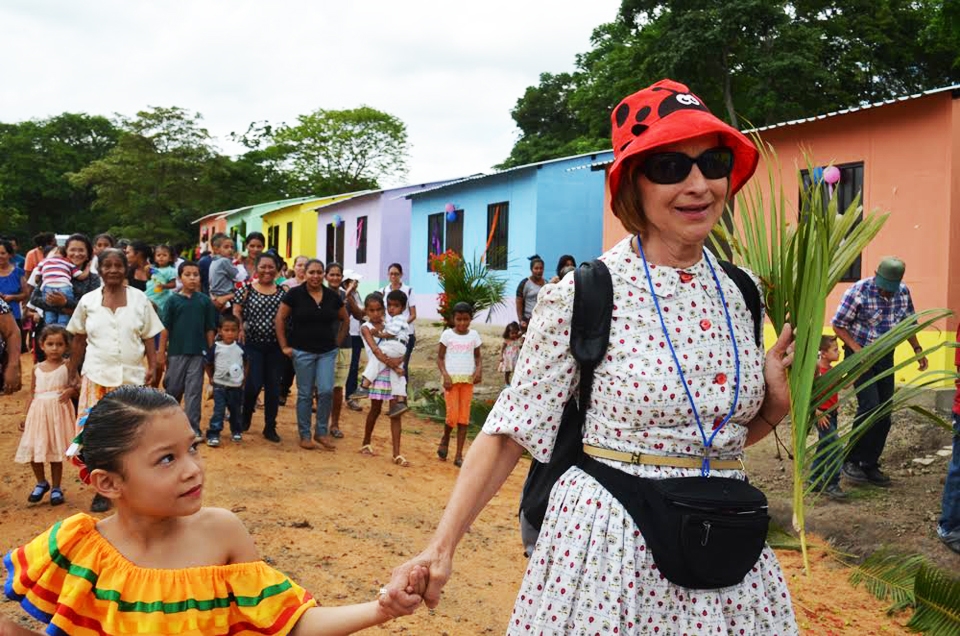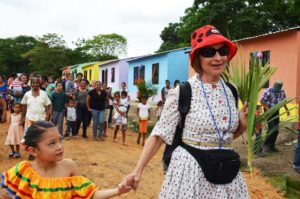
Maria Sawick walks with a young girl in Jicaro, Nicaragua, where a school was dedicated in her late daughter Sara's honor in June. Sawick and her friends raised money for the school, which was built by Food For The Poor.

Sara Sawick’s mother, Maria Sawick (right) walks with residents of Jicaro, Nicaragua, during the dedication ceremony for the St. Kateri Tekakwitha school in June. The school is named after Sara Sawick’s Confirmation saint, who was the first canonized Native American.
Carolyn Conte | Staff Writer
This past summer, non-profit organization Food for the Poor built a school in Nicaragua in memory of a Duquesne student who passed away in 2014.
The newly-founded St. Kateri Tekakwitha School will serve children in the village of Jicaro, Nicaragua. The school is dedicated to Sara Sawick, who was a sophomore liberal arts student when she died unexpectedly two years ago.
In 2013, Sara Sawick traveled to Nicaragua with Food for the Poor, a non-profit organization which builds homes for impoverished communities, like the families of Jicaro. Although Food for the Poor has given Nicaraguans many homes, the families of Jicaro still did not have a school.
After Sara Sawick’s death, the family felt a need to do something in her memory. Her sister, Leah Sawick, came up with the idea that they could start a project in Nicaragua.
“I think her trip to Nicaragua really changed her,” Leah Sawick said of Sara’s passion for the Central American country. “She came back truly changed … she was more grateful, more conscious and more calm.”
The Sawicks created a website, SarasShelters.org, with the goal of raising funds to build a house in the Nicaraguan village. According to the website, a single home in Jicaro costs about $3,800 to build. The fundraiser has netted $20,000 to date, and the family decided to use the influx of funds to take on a larger building project for Jicaro — a school.
Food for the Poor began planning the building in 2014. The school is designed to accommodate all ages, which helped older children in the village who previously had no opportunity for education, according to Executive Director of Food for Poor, Angel Aloma. Previously, younger children had to walk two miles to attend school.
The building has cement floors, five classrooms and a kitchen, according to Aloma. The kitchen is vital, since many of the children depend on the school’s food program for their meals of the day.
“It’s hard to imagine, but many times if their family is large, they have to eat in tandem, where the parents will feed one or two one day and then the others the next day,” Aloma said.
The school was named after Saint Kateri Tekakwitha, the Catholic saint Sara Sawick chose to be her Confirmation saint. Tekakwitha was born in 1656 in what is now New York to the Mohawk tribe of Native Americans, and became the first Native American canonized as a Roman Catholic saint in 2012.
Because Tekakwitha was a native of the Americas herself, students of the Jicaro school may identity with her more, Maria Sawick said.
With the school open, the Sawicks continue their efforts, having set a personal goal to build a new Nicaraguan home every year. They also donate to Food for the Poor and initiatives to help other grieving families.
“We didn’t know what to do with the grief,” Maria Sawick said. “But making something of it helped us heal. It’s such a beautiful gift.”
Aloma said that the kind of poverty present in the Nicaraguan village is much worse than what we might think of when we consider the poorest classes here in the U.S.
“We think we may be poor in the U.S., but there are many nets that help out [here] in the sense of food care checks, subsidized housing, public schooling, food stamps,” he added. “But those children over there are truly destitute, and the governments do not have the resources to help. So they count on people with beautiful hearts like Sara to help them.”
Aloma hopes this education will alleviate the poverty cycle in Jicaro, while also helping the Sawicks heal.
“Her mom said that [Sara] went and that she was on fire to go back. She never made it, but I honestly think that she did make it back,” Aloma said. “I think … for the school that was built in her memory, every time a child is educated in that school, she is present. So, in many ways, she did return.”



